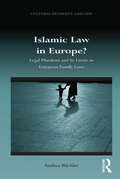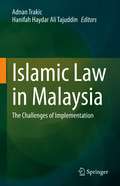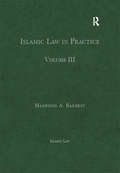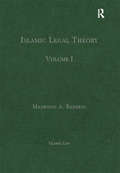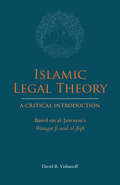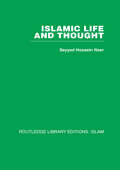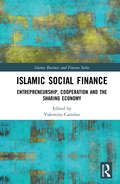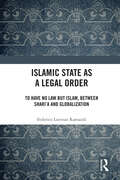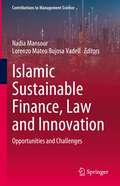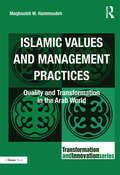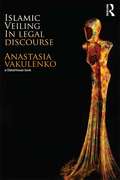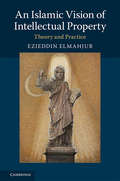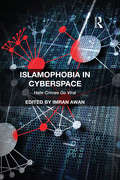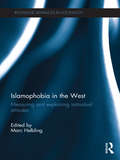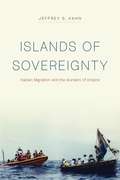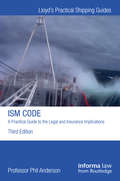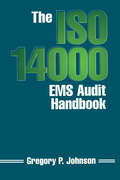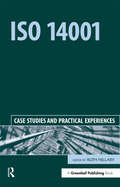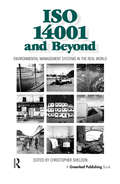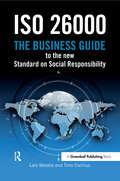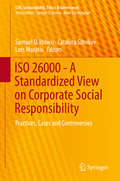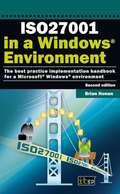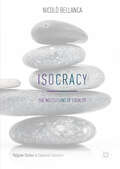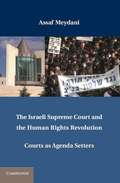- Table View
- List View
Islamic Law in Europe?: Legal Pluralism and its Limits in European Family Laws
by Andrea BüchlerCultural and religious identity and family law are inter-related in a number of ways and raise various complex issues. European legal systems have taken various approaches to meeting these challenges. This book examines this complexity and indicates areas in which conflicts may arise by analysing examples from legislation and court decisions in Germany, Switzerland, France, England and Spain. It includes questions of private international law, comments on the various degrees of consideration accorded to cultural identity within substantive family law, and remarks on models of legal pluralism and the dangers that go along with them. It concludes with an evaluation of approaches which are process-based rather than institution-based. The book will be of interest to legal professionals, family law students and scholars concerned with legal pluralism.
Islamic Law in Malaysia: The Challenges of Implementation
by Adnan Trakic Hanifah Haydar Ali TajuddinThis book examines the challenges of the implementation of Islamic law in Malaysia. Malaysia is a pertinent jurisdiction to explore such challenges given its global focus, colonial history and institutions, and the intersection of the Shari’ah and secularism/multiculturalism. The resultant implementation challenges are underpinned by three factors that make Malaysia an important jurisdiction for those interested in understanding the place of Islamic law in the global context. First, Malaysia is often considered as a model Islamic country. Islamic law is a source of law in Malaysia. The Islamic law legal system in Malaysia operates in parallel with a common law legal system. The two systems of law generally are in harmony with one another. Nevertheless, occasional cross-jurisdictional issues do arise, and when they do, the Malaysian judiciary has been quite efficient in solving them. The Malaysian experience in maintaining such harmony between the two legal systems provides lessons for a number of countries facing such challenges. Second, Malaysia has a developed Shari’ah court system that interprets and applies Islamic law predominantly based on the Shafi’i school of thought. While, for the most part, the approach has been successful, there have been times when the implementation of the law has raised concerns as to the compatibility of Islamic law with modern principles of human rights and common law-based values. Third, there have been cases where Islamic law implementation in Malaysia has gained global attention due to the potential for wider international implications. To do justice to this complex area, the book calls on scholars and practitioners who have the necessary expertise in Islamic law and its implementation. As such, this book provides lessons and direction for other countries that operate a dual system of secular and Islamic laws.
Islamic Law in Practice: Volume III (Islamic Law)
by Mashood A. BaderinIslamic law influences the lives of Muslims today as aspects of the law are applied as part of State law in different forms in many areas of the world. This volume provides a much needed collection of articles that explore the complexities involved in the application of Islamic law within the contemporary legal systems of different countries today, with particular reference to Saudi Arabia, Morocco, Indonesia, Nigeria, Turkey, Malaysia and Pakistan. The articles identify the relevant areas of difficulties and also propose possible ways of realising a more effective and equitable application of Islamic law in the contemporary world. The volume features an introductory overview of the subject as well as a comprehensive bibliography to aid further research.
Islamic Legal Theory: Volume I (Islamic Law)
by Mashood A. BaderinIslamic legal theory (usÅ«l al-fiqh) is literally regarded as ’the roots of the law’ whilst Islamic jurists consider it to be the basis of Islamic jurisprudence and thus an essential aspect of Islamic law. This volume addresses the sources, methods and principles of Islamic law leading to an appreciation of the skills of independent juristic and legal reasoning necessary for deriving specific rulings from the established sources of the law. The articles engage critically with relevant traditional views to enable a diagnostic understanding of the different issues, covering both SunnÄ« and ShÄ«’Ä« perspectives on some of the issues for comparison. The volume features an introductory overview of the subject as well as a comprehensive bibliography to aid further research. Islamic legal theory is a complex subject which challenges the ingenuity of any expert and therefore special care has been taken to select articles for their clarity as well as their quality, variety and critique to ensure an in-depth, engaging and easy understanding of what is normally a highly theoretical subject.
Islamic Legal Theory: Based on al-Juwayni's Waraqat fi usul al-fiqh
by David R. VishanoffDavid Vishanoff&’s thorough and original unpacking of the Sunnī jurist al-Juwaynī&’s (1028–1085) Kitāb al-Waraqāt fī uṣūl al-fiqh introduces English-speaking readers to the main concepts, terms, principles, and functions of the classical Islamic discipline of legal theory. This volume offers an ideal entry to the otherwise dense and complex mainstream Sunnī views that dominated Islamic legal thought in al-Juwaynī&’s day—and that are still widely accepted today. A critical edition of al-Juwaynī&’s Arabic text is also included.
Islamic Life and Thought
by Seyyed Hossein NasrThis collection of essays by one of the best known contemporary Muslim scholars writing in English covers many facets of Islamic life and thought. The author has brought together studies dealing with the practical as well as intellectual aspects of Islam in both their historical and contemporary reality. The contemporary significance of themes such as religion and secularism, the meaning of freedom, and the tradition of Islamic science and philosophy is given particular attention.
Islamic Medical Ethics In The Twentieth Century
by C. A. O. van NieuwenhuijzeConsiders prominent issues in medical ethics in the 20th century, such as abortion, artificial insemination, organ transplantation, euthanasia as discussed by Muslim religious scholars, physicians and jurists. Despite the semi-equal spread of medical knowledge among the peoples of the world and the shared dilemmas brought about by modern medicine, Muslims tend to follow their own medical ethics, which agree ultimately with the basic requirements of Islamic religion and law.
Islamic Social Finance: Entrepreneurship, Cooperation and the Sharing Economy (Islamic Business and Finance Series)
by Valentino CattelanThe current dynamics of world economy show remarkable changes in the socio-economics of credit provision and entrepreneurship. If the emergence of the sharing economy is fostering innovative models of collaborative agency, networking and venture business, economic actors are also looking for a more sustainable development, able to foster profitability as well as community welfare. This book investigates Islamic social finance as a paramount example of this economy under change, where the balance between economic efficiency and social impact is contributing to the transformation of the market from an exchange- to a community-oriented institution. The collected essays analyse the social dimension of entrepreneurship from an Islamic perspective, highlighting the extent to which the rationales of "sharing," distribution and cooperation, affect the conceptualization of the market in Islam as a place of "shared prosperity." Moving from the conceptual "roots" of this paradigm to its operative "branches," the contributing authors also connect the most recent trends in the financial market to Shari‘ah-based strategies for community welfare, hence exploring the applications of Islamic social finance from the sharing economy, FinTech and crowdfunding to microcredit, waqf, zakat, sukuk and green investments. An illuminating reference for researchers, practitioners and policy-makers dealing with the challenges of a global market where not only is diversity being perceived as a value to be fostered, but also as an important opportunity for a more inclusive economy for everybody.
Islamic State as a Legal Order: To Have No Law but Islam, between Shari’a and Globalization
by Federico Lorenzo RamaioliThis book explores the legal dimension of the Islamic State, an aspect which has hitherto been neglected in the literature. ISIS’ dystopian experience, intended as a short-lived territorial and political governance, has been analyzed from multiple points of view, including the geopolitical, social and religious ones. However, its legal dimension has never been properly dealt with in a comprehensive way, assuming as a point of reference both the Islamic and the Western legal tradition. This book analyzes ISIS as the expression of a potential though never fully realized legal order. The book does not describe ISIS’ possible classifications according to the standards and the criteria of international law, such as its possible statehood or proto-statehood, issues that are however touched upon. Rather, it analyzes ISIS’ own legal awareness, based on the group’s literary materials, which show a considerable amount of juridical work. Such material, mainly propagandistic in its nature, is essential in understanding which kind of legal order ISIS aimed at establishing. The book will be of interest to students and academics in the fields of Law, International Relations, Political Sciences, Terrorism Studies, Religion and Middle Eastern Studies.
Islamic Sustainable Finance, Law and Innovation: Opportunities and Challenges (Contributions to Management Science)
by Nadia Mansour Lorenzo Mateo Bujosa VadellThis volume discusses the role and characteristics of Islamic finance and how it can contribute to a sustainable financial system. Islamic finance is not only for the 1.5 billion Muslims. Several countries are interested in it because it has interesting characteristics in terms of transparency and banking regulation. Although the origins of Islamic finance date back several centuries, its resurgence is relatively recent. From its modern beginnings in Egypt and Malaysia, Islamic finance is now a growing sector and its recent performance contrasts with that of conventional banks. Rapid growth and innovation are transforming the sector, driving economic development in an increasing number of jurisdictions, while also increasing the number of new opportunities and challenges. Today, with the problem of climate change and its adverse effects on the whole world, the flexibility of Islamic finance concerning the operations available to those who wish to finance the development of infrastructure, makes this area crucial for sustainable finance.
Islamic Values and Management Practices: Quality and Transformation in the Arab World (Transformation and Innovation)
by Maqbouleh M. HammoudehThe author of this thought provoking addition to Gower's Transformation and Innovation Series has worked as a management consultant in the Arab Middle East for 25 years. In Islamic Values and Management Practices she acknowledges that businesses and other organizations in the region face urgent concerns in relation to quality and transformation, but argues that these issues might be more appropriately addressed by the application of an Islamic Management Model, rather than the 'Western' one hitherto applied. Over time, a set of management systems based on Islamic values has been developed by the author. These systems recognise the need to build human organizations, socially and politically as well as commercially, and also the recognition that for Muslims, justice is the ultimate value, bringing balance between the individual's soul and spirit on the one hand, and the organization's soul and spirit on the other. This Islamic management model stresses that effectiveness is an outcome of operating efficiently and at the same time unifying the organization's objectives with those of its employees and wider society, and ensuring that at the strategic level the long view is always maintained. Recounting her own personal and business journey, Maqbouleh Hammoudeh presents the outcomes of research that has tested the application of the Islamic Management Model and its ability to deliver the desired quality and transformation outcomes in a major civic or profit making organization. At a time when many practitioners and business educators are seeking new management approaches, this revealing case study sheds light on the evolution of a contemporary theory of management for the Muslim World.
Islamic Veiling in Legal Discourse
by Anastasia VakulenkoIslamic Veiling in Legal Discourse looks at relevant law and surrounding discourses in order to examine the assumptions and limits of the debates around the issue of Islamic veiling that has become so topical in recent years. For some, Islamic veiling indicates a lack of autonomy, the oppression of women and the threat of Islamic radicalism to western secular values. For others, it suggests a positive autonomous choice, a new kind of gender equality and a legitimate exercise of one’s freedom of religion – a treasured right in democratic societies. This book finds that, across seemingly diverse legal and political traditions, a set of discursive frameworks – the preoccupation with autonomy and choice; the imperative of gender equality; and a particular western understanding of religion and religious subjectivity – shape the positions of both proponents and opponents of various restrictions on Islamic veiling. Rather than take a position on one or the other side of the debate, the book focuses on the frameworks themselves, highlighting their limitations
An Islamic Vision of Intellectual Property: Theory and Practice
by Ezieddin ElmahjubFor over a century, intellectual property (IP) regimes have been justified using Western philosophical theories rooted in the idea that IP must reward talent and maximize global stocks of knowledge and cultural products. Reframing IP in a context of legal pluralism, Ezieddin Elmahjub brings an Islamic and comparative narrative to the appropriate design and scope of IP rights, and in doing so criticizes the dominance of Western influence on a global regime that impacts the ability of people to access medicine, to read, to imagine, and to reshape popular culture. The Islamic vision of IP, which is based on a broad theory of social justice, maintains that IP cannot simply be seen as a reward for effort or tool to maximize economic efficiency but as one legal right within a complicated distributive scheme affecting fundamental human rights, equal opportunities, and human capabilities.
Islamophobia in Cyberspace: Hate Crimes Go Viral
by Imran AwanCyber hate can take many different forms from online material which can lead to actual offline abuse and violence, cyber violence; cyber stalking, and online harassment with the use of visual images, videos, chat rooms, text and social media which are intended to cause harm. This book examines the case for current guidelines dealing with online anti-Muslim abuse and concludes that we require a new understanding of this online behaviour and the impact it can have on vulnerable communities. It is unique as it focuses on new technology in the form of social media and the Internet and explores the challenges the police and other agencies face when confronting anti-Muslim abuse in cyberspace. It also provides a critique of how people are targeted by online offenders and helps us understand online anti-Muslim behaviour in a much more detailed and comprehensive way by bringing together a range of experts who will examine this phenomenon and critically discuss why they think it has become so much more prevalent than it was before.
Islamophobia in the West: Measuring and Explaining Individual Attitudes (Routledge Advances in Sociology)
by Marc HelblingSince the late 1980s, growing migration from countries with a Muslim cultural background, and increasing Islamic fundamentalism related to terrorist attacks in Western Europe and the US, have created a new research field investigating the way states and ordinary citizens react to these new phenomena. However, whilst we already know much about how Islam finds its place in Western Europe and North America, and how states react to Muslim migration, we know surprisingly little about the attitudes of ordinary citizens towards Muslim migrants and Islam. Islamophobia has only recently started to be addressed by social scientists. With contributions by leading researchers from many countries in Western Europe and North America, this book brings a new, transatlantic perspective to this growing field and establishes an important basis for further research in the area. It addresses several essential questions about Islamophobia, including: what exactly is Islamophobia and how can we measure it? how is it related to similar social phenomena, such as xenophobia? how widespread are Islamophobic attitudes, and how can they be explained? how are Muslims different from other outgroups and what role does terrorism and 9/11 play? Islamophobia in the West will be of interest to students and scholars of sociology, religious studies, social psychology, political science, ethnology, and legal science.
Islands of Sovereignty: Haitian Migration and the Borders of Empire (Chicago Series in Law and Society)
by Jeffrey S. KahnIn Islands of Sovereignty, anthropologist and legal scholar Jeffrey S. Kahn offers a new interpretation of the transformation of US borders during the late twentieth century and its implications for our understanding of the nation-state as a legal and political form. Kahn takes us on a voyage into the immigration tribunals of South Florida, the Coast Guard vessels patrolling the northern Caribbean, and the camps of Guantánamo Bay—once the world’s largest US-operated migrant detention facility—to explore how litigation concerning the fate of Haitian asylum seekers gave birth to a novel paradigm of offshore oceanic migration policing. Combining ethnography—in Haiti, at Guantánamo, and alongside US migration patrols in the Caribbean—with in-depth archival research, Kahn expounds a nuanced theory of liberal empire’s dynamic tensions and its racialized geographies of securitization. An innovative historical anthropology of the modern legal imagination, Islands of Sovereignty forces us to reconsider the significance of the rise of the current US immigration border and its relation to broader shifts in the legal infrastructure of contemporary nation-states across the globe.
The ISM Code: A Practical Guide To The Legal And Insurance Implications (Lloyd's Practical Shipping Guides)
by Phil AndersonThe ISM Code has been mandatory for almost every commercial vessel in the world for more than a decade and nearly two decades for high risk vessels, yet there is very little case law in this area. Consequently, there remains a great deal of confusion about the potential legal and insurance implications of the Code. <P><P> This third edition represents a major re-write and addresses significant amendments that were made to the ISM Code on 1st July 2010 and 1st January 2015. <P><P> This book provides practitioners with a practical overview of, and much needed guidance on, the potential implications of failing to implement the requirements of the Code. It will be hugely valuable to DPAs, managers of ship operating companies, ship masters, maritime lawyers and insurance claims staff.
The ISO 14000 EMS Audit Handbook
by Greg JohnsonThe ISO 14000 EMS Audit Handbook is an innovative and cost-effective approach for the Environmental Management System (EMS) audit to ISO 14001. The Handbook presents comprehensive strategies for conducting all phases of the EMS audit, including effective assessment processes for determining improved environmental performance.
ISO 14001: Case Studies and Practical Experiences
by Ruth HillaryISO 14001 is the star standard among the International Organization for Standardization's ISO 14000 series of environmental management standards. It has seen spectacular growth since its launch in September 1996. Worldwide registrations are set to pass the 20,000 mark in 2000 with 20 times that number reportedly waiting in the wings.In 30 explicit but concise chapters, ISO 14001: Case Studies and Practical Experiences seeks to unravel the truth behind what can and cannot be achieved by ISO 14001 and aims to provide readers with enough knowledge to make choices about its relevance and importance not only to their worlds but also to society. Written by leading practitioners, certifiers, consultants, government and academics, the book examines both the real benefits and the shortcomings organizations have experienced with ISO 14001. We learn from both.Far more ambitious than an implementation guide, the book will provide those readers struggling with the standard first-hand experiences of the real issues they will face in implementing their EMS and, just as importantly, what certifiers look for when they visit firms. ISO 14001: Case Studies and Practical Experiences is a warts-and-all expose of ISO 14001: the issues tackled; the problems faced and overcome; and, above all, the astonishing flexibility of its uses and the diversity of its users.This important book is a must for businesses, researchers, consultants, government officials, students, NGOs and support organisations who want more than just another how-to-do-it manual; but rather the truth about how ISO 14001 is really working on the ground.
ISO 14001 and Beyond: Environmental Management Systems in the Real World
by Sheldon ChristopherOn September 1st 1996, ISO 14001 was published, worldwide. Written over five years in consultation with international industrial experts, non-governmental organizations and regulators, this environmental management systems standard will help organizations manage their impacts on the environment, no matter what their size, nature or location. The implications for the future are enormous. But what does the standard mean in the real world? What changes do managers have to make to accommodate its principles? What decisions need to be faced and when? Is it really going to make a difference or is it just another case of global greenwash? Will it be another missed opportunity for you, your organisation, or your market? At the start of what promises to be a worldwide explosion of interest in standardised EMSs, ISO 14001 and Beyond looks at their creation, their use, and their limitations, attempting to discover the essential truth about this important management tool and where it will take industry. ISO 14001 and Beyond assembles the leading thinkers and practitioners in the field to record their thoughts and experiences on the new standard, its advantages and disadvantages. The book is designed to provide the reader with enough information with which to form an opinion on the future, and how that will influence subsequent actions. It also provides reassurance that, although the problems are real, so are the solutions. ISO 14001 and Beyond gives you the opportunity to read what some of the best minds have made of the standard so far and what they think lies ahead. There are reports covering a global spectrum of concern: from the US, Russia, Japan, Canada, Germany, the UK, and more; from multinationals, small- and medium-sized enterprises, local government, universities and professional bodies. All this material is gathered together in one book to give you the best, most meaningful information for the crucial decisions that you will need to make in the coming months.
ISO 26000: The Business Guide to the New Standard on Social Responsibility (Csr, Sustainability, Ethics And Governance Ser.)
by Lars Moratis Timo CochiusOver the last ten years, Corporate Social Responsibility (CSR) has grown from being criticised as a management fad to being endorsed as good business practice by the majority of the world's leading companies. It has also become ever more complex; and the majority of companies are now in need of clarity and guidance to actively engage with CSR in practice, to develop strategies that reflect the unique context in which each company operates and to embed CSR within their values. ISO, the International Organization for Standardization, began developing an International Standard providing guidelines for social responsibility (SR) in 2005. This long-awaited guidance standard was finally published in November, 2010 as ISO 26000. Developed by stakeholders from industry, government, labour, consumers, non-governmental organizations and others, ISO 26000 will almost certainly become the single most authoritative worldwide standard for SR. In only a few years' time, many thousands of organizations around the world are likely to be using ISO 26000 as a foundation for their SR policies. ISO 26000 is voluntary, and includes no specific requirements; therefore it is not a certification standard. Nonetheless, business users in particular are anxious to measure against the new ISO guideline their current efforts at implementing SR issues within their overall business strategy. Furthermore, many organizations have indicated that they may reformulate current strategies or develop new initiatives based on the content of ISO 26000. This book, written by international experts who have closely followed the development of ISO 26000, is the first to provide potential users with a comprehensive roadmap to the new standard and a compass to identify where they stand in relation to it now. ISO 26000 defines all of the key terminology of SR, provides advice about the ways in which organizations can identify their social responsibilities and how SR can be integrated not only into companies, but into all types of organizations. It is not another code or norm, but an overarching blueprint for social responsibility. This book covers all the key content of ISO 26000, examining the development of the standard, the topics covered and how key themes such as stakeholders are dealt with. It is rich in tools and benchmarking exercises, illustrative material, case examples, and help for companies looking to base their CSR policy on ISO 26000. It also contains an overview of the actions and expectations of organizations that wish to work in accordance with ISO 26000. Timely, detailed and practical, ISO 26000: The Business Guide to the New Standard on Social Responsibility will be an essential resource for the thousands of organizations that need an expert view on how the new standard works, where they stand in relation to it, and how they can work towards developing their CSR efforts in line with its content.
ISO 26000 - A Standardized View on Corporate Social Responsibility: Practices, Cases and Controversies (CSR, Sustainability, Ethics & Governance)
by Samuel O. Idowu Catalina Sitnikov Lars MoratisThis book provides a comprehensive and detailed introduction to the ISO 26000 standard for social responsibility (SR) in businesses and corporations. In addition to discussing the standard’s focus on various stakeholders and seven core topics, the book underscores its key aspects and most debatable issues, with a focus on its connection to sustainable business practices. It presents numerous cases and practical examples of the ISO 26000’s implementation and discusses the outcomes and lessons learned, in terms of the extent to which organizations can envision practicing CSR in ways that fit their activities, stakeholders and environment. Lately, the ISO 26000 has proved to offer an interesting and important approach to the standardization of (corporate) social responsibility. Approached and perceived as a voluntary standard that does not include any specific requirements, determining the best way to implement and work with it involved a considerable amount of experimentation. This book showcases the current state of application and discusses how different countries have developed their own specific versions of the standard, which organizations can use to certify their SR processes.
ISO27001 in a Windows® Environment
by Brian HonanA fundamental title that should be part of every information security practitioner''s technical library!The vast majority of ISO27001 implementations will, to one extent or another, take place in a Windows environment. ISO27001 project managers are not always Microsoft technical experts, but a large number of the ISO27001 controls require a technical implementation. Bridging the gap between non-technical ISO27001 project managers and IT specialists, this book explains what the controls are, and describes how to implement them in a Windows environment, equipping the ISO27001 project manager to succeed with the implementation. MCSEs who have security training (MCSE Security), but who may not understand the ISO27001 approach to selecting and implementing controls, will also benefit from this book. It provides them with the necessary rationale and links their technical understanding of Microsoft information security controls into the international best practice framework for information security. This book should be a core part of the technical library of every MCSE and information security practitioner. If you have a CISSP, CISM, GIAC, or another professional certification, you should read this book. Covering best practice implementation over a wide range of Windows® environments, this second edition is completely up to date for Windows® 7 and Server® 2008. Benefits to business include: * Enable successful implementation Although ISO27001 project managers are seldom Microsoft technical experts, a large number of the ISO27001 Annexe A controls demand a technical implementation. Now, thanks to this book, project managers can finally give a clear explanation to their technical people of what is required under ISO27001. Armed with this guide, a project manager will find it much easier to succeed with implementation of ISO27001 * Help security engineers to understand ISO27001 ISO27001 is the international best practice framework for information security. However, because ISO27001 takes a business risk approach, it is unfamiliar territory to many Microsoft Certified Systems Engineers (MCSEs), even if they already have security training (MCSE Security). With this book, MSCEs can fill a gap in their knowledge and thereby harness their technical understanding of the Microsoft information security controls to drive through implementation of ISO27001 * Improve security and reliability. The purpose of ISO27001 is to ensure the confidentiality, integrity and availability of your business information. By putting suitable controls in place you can achieve these "CIA" goals. In this way you will also make your storage and handling of data more reliable * Take advantage of the tools you already have to hand. Since Microsoft products are so widely used, the technical details in this book are based on the Microsoft Windows® platform. This book shows IT managers how to make effective use of the Microsoft technologies at their disposal to support implementation of ISO27001. As a result, your organisation should be able to achieve certification without having to buy additional third-party software. Security improvements from MicrosoftMicrosoft''s latest desktop operating system, Windows® 7, comes with many security improvements. You can use these to help you to develop an ISMS that complies with ISO27001. One of these features is BitLocker, an encrypting system that allows you to encrypt individual files and folders. You can also encrypt the entire contents of a computer''s hard disk to make the data stored on it unavailable to unauthorised personnel. BitLocker To Go enables you to transport information securely from one system to another using portable devices such as a USB. Another feature of Windows 7, AppLocker, will allow your organisation to restrict the applications available to a user on a desktop. By preventing improper use of key applications by your staff, AppLocker can help your organisation to reduce security risks. This guide provides the IT manager with a detailed breakdown of the various controls requir...
Isocracy: The Institutions of Equality (Palgrave Studies in Classical Liberalism)
by Nicolò BellancaIn the twentieth century there were two great political and social paradigms, the liberal-democratic and the libertarian (in its various socialist, anarchist, and communist delineations). The central idea of the first approach is isonomy: the exclusion of any discrimination on the basis that legal rights are afforded equally to all people. The central idea of the second approach is rather to acknowledge and address a broader spectrum of known inequalities. Such an approach, Bellanca argues, allows the pursuit of pluralism as well as a more realistic and complex view of what equality is. Here he analyzes the main economic and political institutions of an isocratic society, and in so doing, effectively outlines how a utopian society can be structurally and anthropologically realized.This book is ideal reading for an audience interested in the critique of contemporary capitalism through a renewed perspective of democratic socialism and leftist libertarianism. Nicolò Bellanca is Associate Professor of Development Economics at the University of Florence, Italy. He is the author of a broad array of scholarly articles, books and textbooks about both the history of economic thought and development economics. His current research focuses on the theory of institutional change.
The Israeli Supreme Court and the Human Rights Revolution
by Assaf MeydaniThis book explains the reciprocal relations between the Supreme Court and the Israeli political system. It is based on a unique approach that contends that the non-governability of the political system and an alternative political culture are two key formal and informal variables affecting the behavior of several political players within the Israeli arena. The analysis illustrates the usefulness of such a model for analyzing long-term socio-political processes and explaining the actions of the players. Until this model changes significantly, the decisions of the High Court of Justice express the values of the state and enable Israel to remain a nation that upholds human rights. The court's decisions determine the normative educational direction and reflect Israel's democratic character with regard to the values of human rights.
